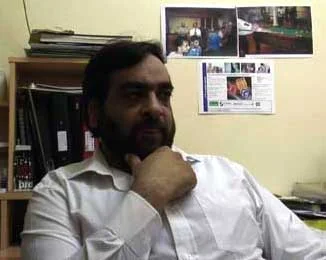Turning Back from the Taliban
For one year from 2007-2008, Amar traveled around the world reporting on how people from all walks of life view the United States through text and video. The following is one of a number of posts from England. For more, click here.
Hanif Qadir at the Active Change Foundation.
Walthamstow - When America invaded Afghanistan, Hanif Qadir sent money to a Taliban-run charity for innocent women and children caught in the war. Then he decided to visit the battle ground himself.
He’d seen pictures of Afghan boys with their private parts blown off by the U.S.-supported Northern Alliance and children weeping over their parents' corpses. “All that to catch 22 people, who America can’t even prove caused 9/11,” Hanif laments. He is against the loss of all innocent lives, he says, Americans included. But departing East London, he half-jokingly warned his British-born family that if he saw America committing the grave injustices he expected, he might become a mujahideen himself and never return.
At the time -- between 2001-2002 -- Hanif saw the "war on terror" as a cover for a “crusade” against Islam. "Terrorism cannot represent any lone religion, let alone Islam," he says. Hanif read reports of a U.S. general saying, "I knew my god was bigger than his. I knew that my god was a real god and his was an idol." Rumsfeld defended this as free speech, while Hanif listened to Bush repeat the "false dilemma," “You’re either with us or you’re with the terrorists." When he heard calls for a war “against evil” Hanif agreed; but the evil was America. And he was ready to get personally involved "helping the innocent."
“I like justice. I’d been in street gangs and fights most of my life" for it, Hanif explained. In his 30s, Hanif left the gangs to run a car garage that employed fifteen people. But “money didn’t give the type of satisfaction” a street fight did. "You miss something not fighting; you miss the crowd. You feel powerful when you know you can call your gang anytime.”
The boy of the English streets who didn’t learn Urdu until later life suddenly felt insecure, unhinged, "searching for meaning." And the global plight of Muslims provided one.
He left Britain for Islamabad, Pakistan, where his parents were born, and then traveled west to Peshawar. From there he took a van to Afghanistan, down narrow, windy roads toward the camps where victims of battle waited. But fate intervened. On his way into Afghanistan, a van filled with wounded men and boys came rushing out toward him. They were fleeing a battlefield massacre not too far ahead.
Among the wounded was a fair-skinned boy, "who looked about fifteen years old...just like my little son,” crying, head bleeding. The boy told Hanif how he'd been recruited from a village near Peshawar and then sent into battle untrained and unarmed, collecting bullets in his chest. This was not a real fight and it was certainly not the justice Hanif imagined. He turned back immediately.
“Good and evil” started to blur in Hanif's mind. He'd never met an American, and had never met a Taliban fighter. It was all Internet videos and word of mouth -- a mythical conflict, in many ways. But on the border of Afghanistan and Pakistan, real life stepped in.
Paradoxically, Hanif became less confused, not more. His mind refocused on his own son, on his family and community. Hanif "cleaned up" and "raced back" to England. Three days after his return, the son of a close family friend was stabbed in the face during a gang fight and died. Violence was at home too, in a way Hanif understood.
So he sold his car garage business and opened a community center called The Active Change Foundation to provide a haven for street youth. The center, located just by the nearest mosque, is frequented primarily by young Muslim men. But when fourteen people from this small part of town were seized in a anti-terror raid last summer, the "war on terror" came home to him.
He now sees his work as providing a haven for isolated, angry youth, who are at risk of turning toward terrorism. He understands them: how they seek purpose, how jihad justifies urges toward violence and turns their social ostracism into a badge of honor. It's easy to imagine a "holy war" when both America and Afghanistan/Iraq lie far away and when the struggle is framed bluntly as "good versus evil". It's possible to be against terrorism and "not with America" says Hanif. Cultivating the middle ground and admitting moral ambiguities could help, he says, though it may not be good for campaign sloganeering.
